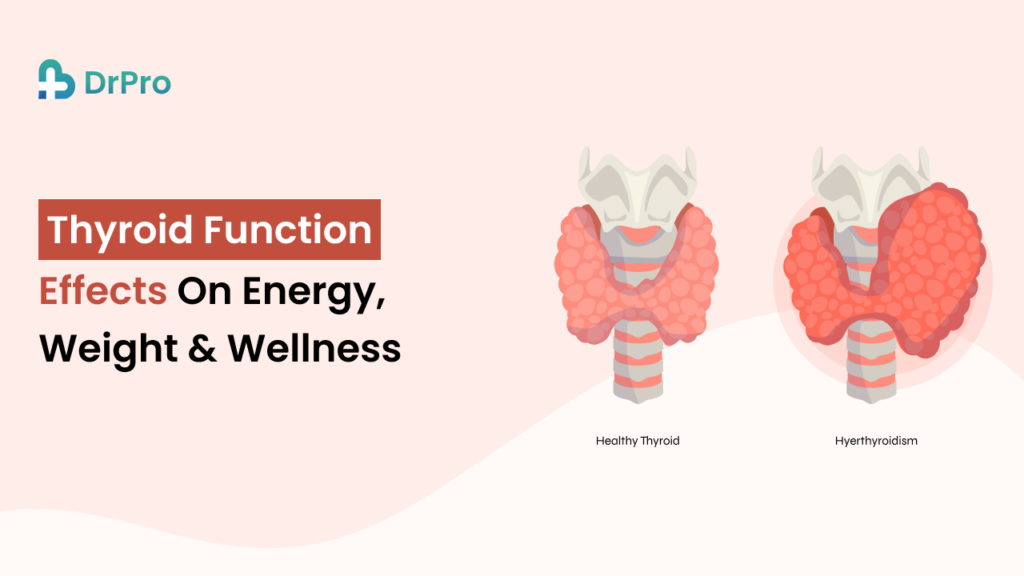Thyroid health is an important aspect of overall health. Hormones produced govern metabolism, energy levels, body weight, and general well-being. So problems with thyroid function may be responsible for various health problems: feeling tired, losing and gaining weight, and having mood changes.
This blog describes the importance of thyroid function, how it works, and what one can do to maintain thyroid health.
What Is the Thyroid Gland?
The thyroid is a butterfly-shaped gland situated at the front of the neck. The thyroid gland produces thyroid hormones, which help maintain bodily metabolism, energy production, and organ function.
Thyroid Hormones and Their Functions
The following are the two principal hormones secreted by the thyroid gland:
- Thyroxine (T4) – Generally converted into T3 in the body and helps regulate metabolism.
- Triiodothyronine (T3) – The active hormone responsible for regulating energy production and organ function.
The pituitary gland controls the production of thyroid hormones by releasing thyroid-stimulating hormone (TSH) to maintain a balanced level of hormones.
Effects of Thyroid Function on Energy Levels
The thyroid plays a direct role in energy production. When the thyroid is underactive (hypothyroidism) or overactive (hyperthyroidism), it triggers a chain of events that can result in low-level fatigue or an overabundance of energy.
Hypothyroidism and Low Energy
The metabolic slowdown resulting from an under-functioning thyroid manifests as:
- persistent fatigue
- Cold intolerance
- Weakness and muscle cramps
- Lack of concentration- brain fog
Hyperthyroidism and High Energy
Hyperactive thyroid means hyperactivity in metabolism:
- Restlessness and agitated state of mind
- Inability to sleep- insomnia
- Profuse sweating
- Racing heart
In short, the energy levels are stable only when thyroid functions are maintained in equilibrium.
More Updates For: Blood Clot in the Brain Types Causes and Treatment
How Thyroid Function Affects Body Weight
Thyroid hormones control metabolism, having direct effects on body weight.
Hypothyroidism and Weight Gain
Slow thyroid function decreases metabolism, which leads to:
- Unexplained weight gain
- Retention of water and the sensation of bloating
- Accumulation of fat
Hyperthyroidism and Weight Loss
The hyperthyroid state accelerates metabolism, which will cause:
- Weight loss for no apparent reason
- Increased appetite but no weight gain
- Emaciation due to muscle weakness from wasting energy
If you have noticed unexplained weight changes, you may want to check your thyroid function to rule it out.
Thyroid’s Role in Mental Wellness
Thyroid dysfunction also affects mood, emotion, and mental health.
Hypothyroidism and Depression
Low levels of thyroid hormone can cause:
- Depression or low mood.
- Problems with memory and concentration.
- Lack of motivation.
Hyperthyroidism and Anxiety
Excess thyroid hormones can cause:
- Nervousness or irritability.
- Panic attacks and excess worry.
- Mood swings.
Proper treatment of the thyroid will stabilize mood and improve overall well-being.
Common Thyroid Disorders
Thyroid problems are very common and typically have some genetic dietary and lifestyle factors associated with their development.
1. Hypothyroidism (Underactive Thyroid)
- It is the cause of autoimmune disorder-cum-Hashimoto’s thyroiditis.
- It causes fatigue, weight gain, and depression.
- Thyroid hormone replacement therapy is required.
2. Hyperthyroidism (Overactive Thyroid)
- Condition related to Graver’s disease (an autoimmune condition).
- It gives weight loss, anxiety, and rapid heart rate.
- Usually, treated by medications or thyroid surgeries.
3. Thyroid Nodules
- They are small growths within the thyroid gland.
- Most of the time harmless but may interfere with hormone levels.
- Seek evaluation if it keeps growing or is symptomatic.
4. Goiter
- Enlargement of the thyroid gland.
- Can be caused due to iodine deficiency or hormonal imbalance.
- Treatment depends on the etiological factor and severity of the disease.
How to Maintain Thyroid Health
Keeping the thyroid well maintained always goes with the flow on the energy level, the weight profile, and mental health.
1. Eat a Thyroid-Friendly Diet
- Include iodine-rich foods (such as seaweed and dairy, eggs)
- From selenium and zinc (including nuts, fish, and whole grains)
- Keep processed foods and excess sugar from your diet.
2. Stress Management
- Chronic stress hampers thyroid functioning.
- Do yoga, meditation, or deep breathing.
3. Exercise Regularly
- Regulates metabolism, and energy levels.
- In addition, improves mood and reduces stress.
4. Get Enough Sleep
- Sleep is necessary for hormonal equilibrium and optimum functioning of the thyroid.
- For adults, 7-9 hours of sleeping time is the recommended amount.
5. Regular Thyroid Checkups
- Routine blood tests (TSH, T3, T4) will catch most thyroid issues early.
- Consult with a doctor on the feeling of fatigue, changes in weight, and mood.
Conclusion
The thyroid is an important regulator of energy, weight, and mental health. Disorders of thyroid function can give rise to health problems, such as fatigue, rapid weight loss or gain, and mood changes.
A well-balanced diet, stress management, and regular health check-ups can foster thyroid function and general well-being. If there are signs of thyroid imbalance, consult your healthcare provider for diagnosis and treatment.
Frequently Asked Questions (FAQs)
Q1. How do I know if my thyroid is not working correctly?
Signs of thyroid problems can include fatigue, sudden changes in weight, erratic moods, and changes in sensitivity to temperature. A blood test can reveal the state of the thyroid.
Q2. Can thyroid problems cause anxiety and depression?
Thyroid dysfunctions may jeopardize mental health. Depression may arise from hypothyroidism, while anxiety and irritability are attributed to hyperthyroidism.
Q3. What foods are good for thyroid health?
Thyroid function benefits from foods abundant in iodine, selenium, and zinc (fish, dairy, nuts, whole grains). Avoid processed foods and refined sugar.
Q4. Can stress affect my thyroid?
Indeed, constant stress can interfere with thyroid hormone formation. Therefore, stress management fosters thyroid health through meditative skills, physical exercise, and restful sleep.
Q5. How often should I check my thyroid function?
If symptomatic or with a family history of thyroid dysfunction, annual thyroid testing is recommended; otherwise, regular check-up visits to the physician are sufficient.


